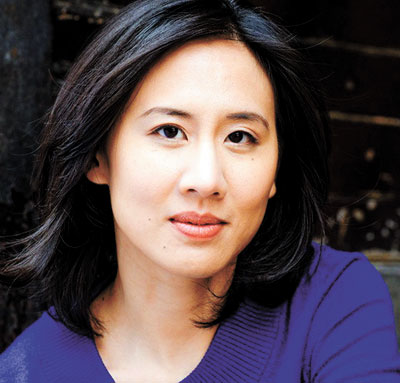
FOR years, overseas Chinese writers have felt like outliers to the international literary circle with only very few names known by readers. Celeste Ng might be an exception. While other overseas Chinese writers are still telling stories to Chinese people or struggle with their English writings, Ng has already made her way to the mainstream circle. Her debut novel “Everything I Never Told You” beat Stephen King, Richard Flanagan, Martin Amis and Hilary Mantel to lead Amazon’s 100 best books of 2014. The book was recently released in China, and 200,000 copies sold in the first week. Ng’s novel is about a Chinese-American family in the ’70s in Ohio. In the novel, Lydia is the favorite of three children born to Marilyn, a white woman, and James, a Chinese immigrant. It is a book about race discrimination, culture and family. “There isn’t a false note in this book, and my only concern in describing my profound admiration for this book is that it might raise unachievable expectations in the reader,” Amazon senior books editor Chris Schluep told U.K.-based The Guardian last year before the book was published in Britain. “But it’s that good. Achingly, precisely, and sensitively written.” Ng’s parents, both scientists, moved from Hong Kong to the United States in the late 1960s and raised Ng in a small, blue-collar suburb of Pittsburgh. She went on to study English at Harvard, ultimately graduating from the University of Michigan with an MFA. Her stories and essays have appeared in many newspapers and magazines, including The New York Times, One Story, and Five Chapters, and she was awarded the Pushcart Prize, the Hopwood Award and a scholarship to the Bread Loaf Writers’ Conference. It took Ng six years to finish “Everything I Never Told You.” Before she selected her publisher, more than 10 top publishers participated in bidding for the rights. Eventually, Penguin Books won the bid and published the book in the United States. “I think I was very lucky. When I was told that Penguin Books had won the bid, I was at home. I really want to tell you that I went out celebrating for a whole night, but I didn’t. Instead, I went to pick up my son at kindergarten. I think that having a child at home has helped me keep calm during that crazy period of time,” she said. As a daughter of immigrants, Ng grew up in predominantly white neighborhoods with her Chinese identity. “My parents have always been aware that we are outliers of society, and people would make assumptions about our race based on our behavior. Therefore, they kept telling us to behave ourselves at school so that people would have a nice impression of Chinese people,” she said. “This sounds a little silly, but that’s how it worked.” When Ng first started writing the novel, she just wanted to write about a family and their secrets. However, the story eventually included issues of race and culture. “I did not intend to write a story about Chinese-Americans because I thought I was an outsider to Chinese culture. I was born and raised in the United States and I did not speak Cantonese. However, as I wrote about this family, I realized that culture was a crucial part of their stories, so I added this element to my novel,” she said. In the novel, Ng poured her understanding of being a Chinese-American into the character of James, who was often the only Asian student in school. James always thought that he was an outlier at school and failed when trying to blend in. Later he went to study at Harvard but found himself lost in identity. These experiences affected his whole life. “This is familiar territory, but Ng spins an unfamiliar tale … If we know this story, we haven’t seen it yet in American fiction, not until now. This is a novel about the burden of being the first of your kind — a burden you do not always survive,” said a review by The New York Times. Besides the exploration of race and culture, what else helped make the novel such a phenomenon globally? “Race and culture are just small parts of this novel. It also explores issues such as women’s rights and values, parenting issues and teenage issues. No matter what stage of life you are at, you can find yourself in this novel,” said Mu Caocao, the Chinese editor for the book. “This novel is mainly about family and morality. Ng used a Chinese story to bridge the culture gap and demonstrate the ultimate goal of everyone’s life — to let go of other people’s expectations and find yourself. It is this spirit that has won the hearts of Western readers.” (Wang Yuanyuan) | 
